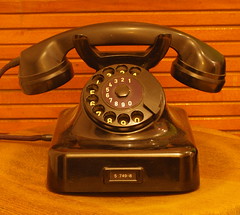 By BitcoDavid
By BitcoDavid
Penal systems in all 50 states, as well as the Federal, tend to shuffle inmates around. Bed space, behavior, medical status, drug use, gang affiliation and race are only some of the factors that may go into these decisions. Nevertheless, it is not at all uncommon for inmates to be – suddenly, and with no explanation – removed from access to visiting family members and friends. Hence – in prison – little is as valuable as phone privileges.
But, like everything else in prison, the phone costs money. Phone time is charged by the minute, and either paid by the inmate or his family. The problem faced by the Deaf however, is that phone communications take much longer. Most prisons in the U.S. will not allow inmates to contact a Video Relay service. This is done – we’re told – for security reasons. That leaves the Deaf inmate with the far more archaic and cumbersome alternative of TTY. A TTY phone requires typing. In the time it takes you or me to say, “Hello mom. How’s Aunt Sadie?” a Deaf inmate struggling with a TTY keyboard may not even get in the first “H.”

Modern TTY Phone Image: E. Michigan Deaf and Hard of Hearing
Prison systems don’t have a problem with charging this inmate at the same – by the minute – rate, as they do the hearing prisoners, resulting in cases where Deaf inmates have been charged as much as 17 dollars for a local call.
The FCC has been alerted as to this iniquity, and the prison systems have been cited with violating the ADA. As you know, Talila Lewis and HEARD have been working diligently on correcting this issue. She recently sent out the following e-mail to members.
Friends,
My classmate created a very useful tool to help advocates and organizers keep up with comments that flow into the FCC during public comment periods. He would like to ensure that disability rights advocates have access to his project and asked me to share the following information:
If you would like to receive a tidy email with a daily digest of filings in FCC Docket No. 12-375 (Implementation of the Pay Telephone Reclassification and Compensation Provisions of the Telecommunications Act of 1996 et al. -AKA – What Should the FCC do Re Excessive Telephone Rates for Prisoners & their Families?), sign up here: http://bit.ly/WZlAXn
Alan’s Message to the Disability Rights Community about his project: Dokket.com is a tool designed to make it easy to track proceedings at the FCC. The FCC’s current system, ECFS, is difficult and clunky even for experienced communications law professionals. Though I’m still figuring out if I would like to commercialize Dokket, seek grant money, or continue bootstrapping it, I’d like to offer these email alerts free of charge to the disability rights community. If you have any questions, email me at [email protected].Have a great evening!Best,TLP.O. Box 1160
Washington, D.C. 20013
www.behearddc.org202.455.8076 voice
202.436.9278 VP
The bit.ly link will take you to an active Java applet that allows you to sign up for daily e-mails. Here’s the direct link to Dokket. com, as well.
And here’s an embedded and captioned video from HEARD, that explains this whole thing very well.

BitcoDavid is a blogger and a blog site consultant. In former lives, he was an audio engineer, a videographer, a teacher – even a cab driver. He is an avid health and fitness enthusiast and a Pro/Am boxer. He has spent years working with diet and exercise to combat obesity and obesity related illness.
Related articles
- FCC to Hear Case on Deaf Telephone Rate Inequity (deafinprison.wordpress.com)
- FCC Eyes Prison Pay-Phone Rules to Protect Inmates (atlantablackstar.com)
- Deaf CCA Inmate Sues DC for Mistreatment (deafinprison.wordpress.com)
- ADA ignored by Denver Law Enforcement (deafinprison.wordpress.com)
- Texas SC to Study Wrongful Convictions (deafinprison.wordpress.com)
- DeafInPrison rough in Britain, Too (deafinprison.wordpress.com)
- FCC May Regulate Prisoner Phone Service (blogs.wsj.com)
- For Police Officers: VRS, VRI or Live Interpreter? (deafinprison.wordpress.com)

